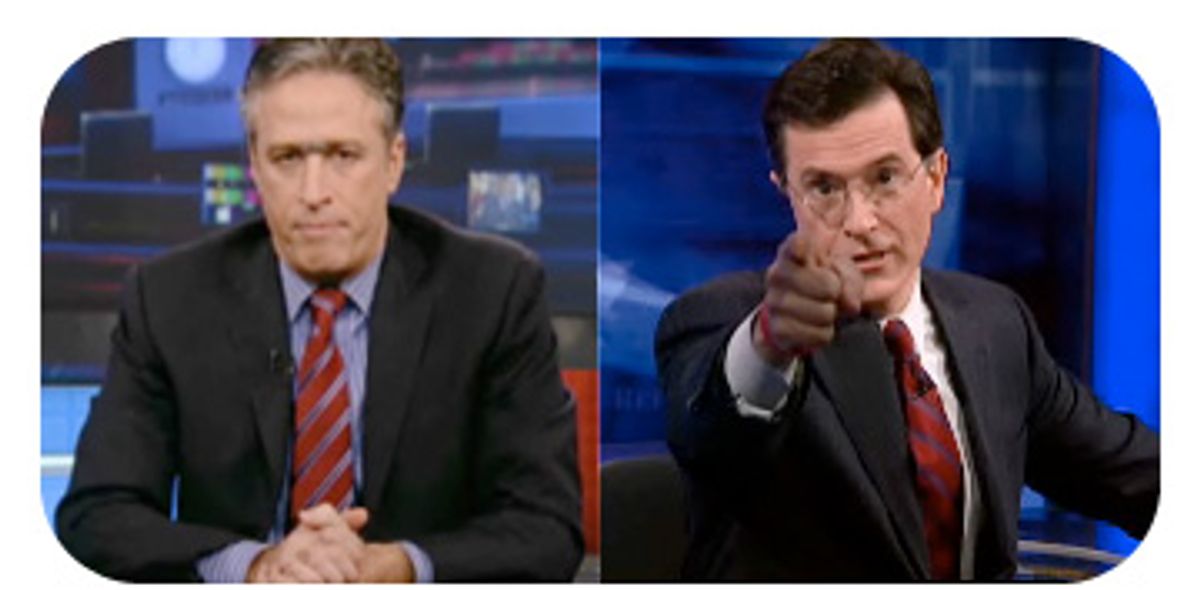"Who's writing this stuff?"
That question may have been lingering on the minds of longtime fans of "The Daily Show With Jon Stewart" when the show returned to the air Monday night without its writers.
But not surprisingly, Jon Stewart has been longing to take a crack at the 2008 presidential race as much as we've been longing to hear him do it. How can we possibly navigate the absurd spectacle of American politics without him? "Imagine this is an image that you see when you're not on the air," Stewart said, and cut to a shot of Mike Huckabee in Iowa, flanked by ... Chuck Norris.
It was just like the good old days for a second there -- but only for a second. As the show unfolded, the jokes were more scarce than usual. Stewart's timing and clever asides were as skilled as ever, but without a steady flow of great material, the pace slowed to a crawl. It was like watching the Great and Powerful Oz's decorative flamethrowers malfunctioning. You could almost hear the viewers at home saying, "Wait, you mean Jon Stewart doesn't make up all that funny stuff on the spot?"
Apparently not. After a somewhat rambling bit about Internet residuals, Stewart spent the balance of the show discussing the writers' strike with Cornell professor Ron Seeber, who studies labor relations and conflict resolution. Having referred to the situation as "uncomfortable," Stewart seemed anxious to explain his own attempts to reach a side deal with the WGA, as previously reported on Nikki Finke's Web site, Deadline Hollywood.
Stewart: What about the Writers' Guild, they are making interim deals with a variety of groups. Is that a smart strategy, and are they being arbitrary with it, maybe perhaps denying some shows who would willingly do it?
Seeber: I suspect that their strategy is to try to get a number of these side-deals and then to set that up so that that puts pressure on the big guys.
Stewart: It seems like a bottom-up strategy. That's a smart strategy. Wouldn't you want to get as many shows ... Let's say you're not that big. Let's say you're on basic cable. But you would do it, and you've gotten your company to say OK, even though they currently think you're insane. Why would you turn something like that down?
Seeber: Well, it's hard to say. I think that the Guild is probably thinking about those questions all the time.
Here's a more likely explanation: Your little basic cable show is owned by Viacom, one of the central members of the AMPTP, the film and TV producers who have refused to budge in their negotiations with the Writers Guild. According to Finke, Stewart griped about the guild at the show's taping on Monday, but said that the strike is important and that he supports the writers. While guild members picketed the show and some posters on Finke's site called Stewart a scab, Michael Winship, president of the Writers Guild of America East, told an Associated Press reporter that the strikers took issue with Comedy Central and Viacom, not Stewart or Stephen Colbert.
Not surprisingly, Colbert, who donned a fake strike beard in the post-"Daily Show" promo for "The Colbert Report," struggled less with the uncomfortable circumstances of his show's return. After an empty intro -- "Tonight! Then! This! Plus! This is 'The Colbert Report!'" -- Colbert addressed the strike.
"There's an elephant in the room here. Why am I on the air?" He asked, and then clarified, "I have always been anti-labor! I have always been anti-union!" Colbert then played a montage of clips where he expressed his hatred of unions.
Since "The Colbert Report" hinges on such farce, it follows that the spring in Colbert's step wouldn't be missing, even if some of his comic bits were. Colbert's absurd persona is what keeps this ship afloat, after all, and apparently the man is damn good at embodying the same chirpy blowhard, quips and all, with or without his writers.
Colbert's interviews were as enjoyable as they always are, first with Andrew Sullivan, who discussed his support for Barack Obama (who won't personally appear on the show because of the strike), and then with Harvard professor Richard Freeman, who also studies labor issues. The mix of two rapid, upbeat interviews with clips from previous shows worked well for Colbert, and will probably be a formula he sticks with in the weeks or months to come as the strike wears on.
But will it be the same? Of course not. As perky and resilient as Colbert or Stewart manages to be in the face of the strike, trying to hold their shows together night after night without writers should prove to be positively exhausting.
"All right, I think I've made this clear. I don't like unions," said Colbert after his anti-union flashback montage. "And you know what, folks? I don't need my writers. Which brings me to tonight's word ..." On cue, the screen for "The Word" dutifully popped up, but no word appeared on it. Colbert stared expectantly at the blank blue space. He'd better get used to that feeling.



Shares